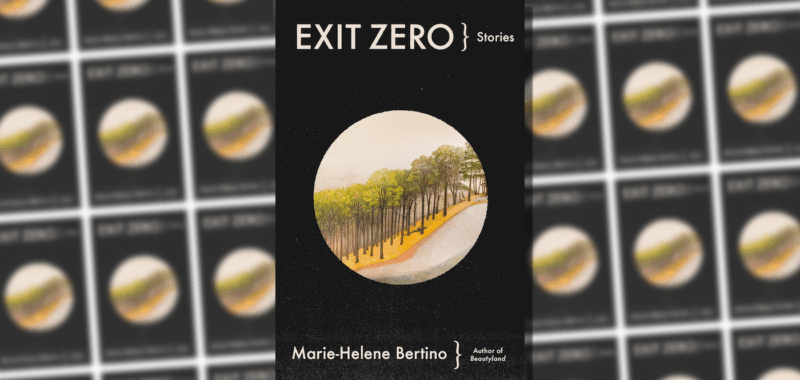Last year saw the publication of Marie-Helene Bertino’s novel Beautyland, the story of a young Italian-American woman slowly developing into a writer who turns her sense of alienation from the world into an iconic point of view. There’s also the matter of the protagonist possibly being an alien. One could read Beautyland as an extended metaphor (à la Will Self’s Great Apes) or a very low-key work of science fiction (a la John Wyndham’s Chocky), and some of that same ambiguity persists in the stories collected in Bertino’s new collection Exit Zero.
Exit Zero is, overall, much less ambiguous about its uncanny and fantastical elements; the unicorn that shows up in one story is very real, and capable of doing unholy things to a hotel room at that. There’s still much of the same blend of formalism and heartache that characterized Beautyland on display here: Several of the stories focus on protagonists who are left to deal with the unfinished affairs of a family member or loved one. (That’s what the unicorn is doing there.)
Bertino also utilizes some of the same attention to regional detail that populated Beautyland’s descriptions of Philadelphia and New York City. The title story takes its name from the southernmost exit on the Garden State Parkway (typed the critic who grew up near Exit 109), and south Jersey provides a backdrop for several of the stories here.
“Exit Zero” is the one with the unicorn, by the way. Protagonist Jo is staying temporarily in the town of Rio Grande, New Jersey, where she’s settling her late father’s estate, one component of which is the aforementioned horned creature. Jo dubs the unicorn Jasmine; a zookeeper interested in the unicorn’s welfare corrects her, stating that her name is “a sound like a breeze moving through plastic tubing in an open field.”
Buy the Book


Exit Zero
The juxtaposition of real places and the surreal is a device Bertino uses throughout the collection to memorable effect. The final story here, “Viola in Midwinter,” begins with an opening that seems pulled from the “Kmart Realism” movement of the 1980s:
The Margaretville Shop & Save stays open twenty-four hours as a service to hunters, hospital employees, sex workers, and other creatures who work at night. Viola in predawn debates poppers and pharaoh snakes in the fireworks aisle. In the checkout line, hunters discuss a bobcat one saw on his drive into town. A mama, probably, looking for food before the real snow arrives and locks the county into place.
That’s a stunning amount of detail and stage-setting accomplished in a handful of sentences. It isn’t hard to imagine a wholly realistic story playing out in this vein, but Bertino has other plans. After a few more pages, we understand two things very clearly: Viola is much older than she seems, and she subsists on blood. (Both human and animal varieties are acceptable.) This isn’t quite a typical story about vampirism, though it does borrow some of its tropes. Instead, Bertino is a lot more interested in seeing what that sort of immortality might do to someone; how they might adapt to living far longer than they’d planned, and what compromises they might make along the way.
The collection’s strongest story, at least for this reader, is the haunting “The Ecstasy of Sam Malone.” Yes, as in Ted Danson’s character on the television show Cheers. The narrator begins the story by recalling her one year of college, and a professor who’d made an impression on her by discussing psychoanalyst Donald Winnicott’s idea of the false self. She has an awkward conversation with her mother, then ventures out with her friends in search of alcohol. And when she comes to after presumably blacking out, she’s in a world that’s one part purgatory, one part Cheers.
In the darkness, a song plays above us on speakers I can’t see. A man sings. It is the theme song from Cheers, my mother’s favorite show. I recognize the actors though they look the same age as in the 1980s and ‘90s when the show was broadcast.
The idea of sitcom-as-purgatory isn’t unique to this story, but Bertino doesn’t go to any obvious places; there’s no moment when one of the characters turns suddenly sinister or demonic, for instance. The sheer weirdness of the situation gives the story its own haunting energy. In the opening paragraph, the narrator sets the story up for us by placing it in a time when “I was still a barfly,” and there’s something inevitable about a bleary-eyed night winding up in one of the most archetypal watering holes in all of popular culture.
As for the song the narrator hears playing when she first arrives in Cheers? Well, its title happens to be “Where Everybody Knows Your Name.” (It’s also quoted in The Mountain Goats’ “Autoclave.”) The narrator’s name, of course, goes unsaid throughout.
The best of these stories tap into the same heartfelt sense of isolation that Bertino’s Beautyland did, but find different variations on that theme. There’s a particular sentence in this collection that feels like a statement of purpose for the book as a whole: “Family can slough away from you like bones shed meat in boiling water.”
There’s something visceral about that sentence, but there’s also something powerfully ambiguous about it. It all depends on how you view the image of a bone shedding its meat. Are you witnessing a kind of transmutation, or are you witnessing a separation, the birth of something new and alone? When Exit Zero is humming, it turns that sense of isolation into something hallucinatory, sad, and beatific.
Exit Zero is published by FSG Originals.

